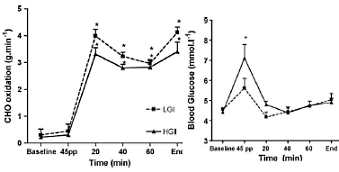|
Definition: "An ergogenic aid is any substance or phenomenon that enhances performance "
|
|
||||||||
01.08.2010 |
|
|
Low GI breakfast gives endurance athletes faster times
Your mother probably always told you to eat whole wheat bread in the mornings, but since you've been training seriously you've changed to pasta and white rice: packed with carbs, but hardly any dietary fibre. That's what an endurance athlete should be eating, you've probably been told by the 'experts'. Well, the 'experts' don't know what they're talking about, according to British sports scientists at the University of Hull. But your mother does.
Foods that send your sugar and insulin levels soaring, like pasta and white bread, are said by scientists to have a high glycaemic index [high GI].
Sports scientists are still convinced that endurance athletes perform best when they have lots of carbohydrates in their body. So on paper, high GI foods are best suited to endurance athletes seeking maximal performance. But is this really the case? The British study, which was published in the Journal of Science and Medicine in Sport, says no.
The Brits did an experiment with 10 experienced male cyclists who clocked up an average of 150 km a week. The athletes were given breakfast on two occasions, consisting of semi-skimmed milk and Kellogg's cereal. On one occasion the athletes were given Corn Flakes [High GI], and on the other Bran Flakes [Low GI].
An hour after eating the athletes had to cycle 40 km. After the low GI breakfast, the athletes completed the ride in an average of 93 minutes. When they'd had a high GI breakfast they took 96 minutes for the same distance.
Bran Flakes give athletes longer lasting energy than Corn Flakes, the researchers discovered when they calculated the amount of glucose the cyclists burned and measured the concentration of glucose in their blood.
The athletes made less use of their fat reserves after the high-fibre low GI breakfast.
And just in case you were wondering: no, not a single penny from the business world financed the study.
Source:
More:
|
|



